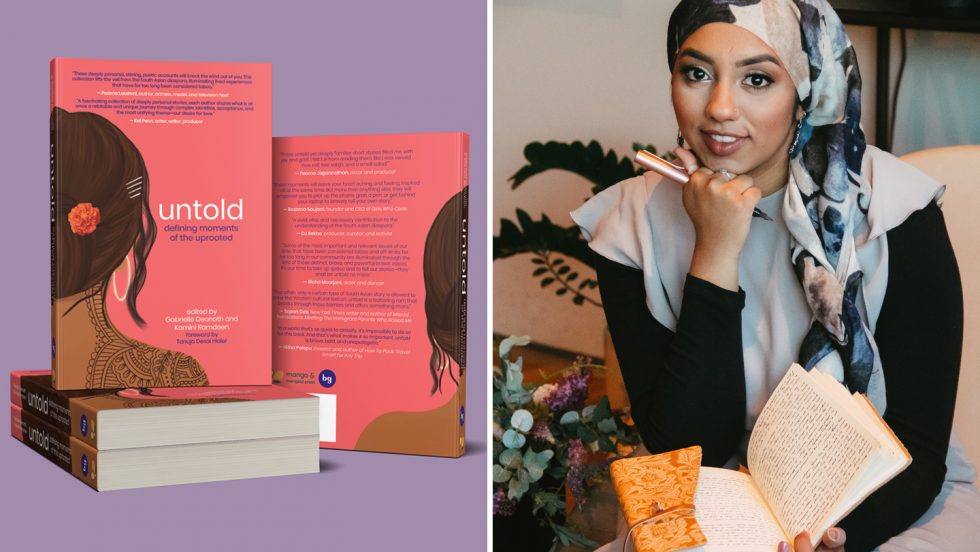
Gabrielle Deonath, an Adelphi alumna who graduated with a bachelor’s degree in communications in May 2018, is the co-editor of the new anthology, untold: defining moments of the uprooted, which will be released in March 2021 by Mango and Marigold Press. The focus is on representing Muslim and South Asian females.
During her time at Adelphi, Deonath—a Guyanese American Muslim writer, editor and content creator—learned many skills she used when creating the book. She credited writing workshops, taught by Katherine Hill, assistant professor of English, for equipping her with important skills that she tapped into when collaborating with the anthology’s contributors.
“Many of the notes that Professor Hill gave me when I was in her classes are the same notes that I gave writers at different points,” Deonath said. “It’s an extremely vulnerable thing to share the intimate truths of your life with the world, so my co-editor, Kamini Ramdeen, and I tried to push the writers out of their comfort zones but in very gentle ways. In those moments, I often thought of Professor Hill’s advice.”
Deonath’s beginnings as an editor are rooted on Adelphi’s campus. She was not just a writer, but also served as the editor-in-chief of The Delphian in her senior year.
“Being an editor on The Delphian and working as a tutor in the Writing Center taught me how to help others tell their stories or communicate their message through writing,” Deonath said. “That was essential experience to have on this project because some of the ‘untold’ writers are being published for the first time, sharing very personal stories. I know firsthand how tricky telling your own story can be.”
According to Deonath, who is now a full-time writer for the Girl Scouts of the USA, she has carried the lessons that she learned from her time at Adelphi into her adult life and career.
However, college was not Deonath’s first taste of publishing. She began writing professionally at age 16. Her first published piece was a personal essay about her decision to wear the hijab while in high school, which she submitted to a popular Islamic blog. By sharing her life experiences and creating spaces for others to share their own, Deonath said she hopes to increase representation of minorities, especially Muslim and South Asian girls and women.
“Representation is a matter that has been very close to my heart. As a young girl with South Asian roots, I had to turn to Bollywood films to see faces that looked like mine on screen,” she said. “Being Muslim, I learned at an early age about the consequences of misrepresentation in popular culture, not just in TV and movies, but also in the media. That’s one of the reasons why I decided to become a journalist. I saw a problem and I wanted to be part of the solution.”
Although she did not know submitting her first essay in high school would lead to her work being published, it was just the beginning. In her sophomore year of college, she also founded Brown Girl Magazine, the multimedia company behind untold. She started as a staff writer, but soon became an assistant editor for the politics and Indo-Caribbean teams, under managing editor Kamini Ramdeen. Now five years later, she is not only an editor of the anthology alongside Ramdeen, but she is also a writer of one of the 31 narratives in this joint creation on the South Asian experience in the diaspora. In her story, she revisits the same topic she started her career with—her choice to wear the hijab—but this time, through the creative nonfiction genre.
Deonath said that her participation in the anthology is among her proudest accomplishments to date because she was able to help bring forth a book that would give representation to a minority group that is not highlighted in mainstream media often enough.
“I’m so honored to be an editor on this project because I haven’t come across an anthology that puts the voices and stories of everyday South Asian women living in the diaspora at the forefront like this before,” she said. “Many of the topics that these stories cover—divorce, addiction, mental health, infertility, LGBTQ+ issues and more—aren’t spoken about openly in the larger South Asian community.”
Her hopes for this collection are that it “sparks and normalizes conversations on these issues, while also inspiring people, especially those who often lack representation, to share their own stories.”
untold: defining moments of the uprooted is available for preorder.
—This story originally appeared in the December 10, 2020 issue of The Delphian.